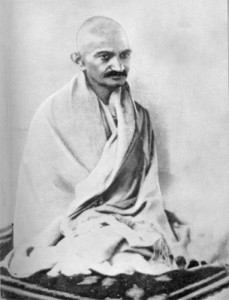February 18:
 “There is not a single virtue that aims at, or is content with, the welfare of the individual alone. Conversely, there is not a single offense which does not, directly or indirectly, affect many others besides the actual offender.”
“There is not a single virtue that aims at, or is content with, the welfare of the individual alone. Conversely, there is not a single offense which does not, directly or indirectly, affect many others besides the actual offender.”
–Gandhi (Ethical Religion, p. 55)
One of the most important virtues for Gandhi was self-control, swaraj (swa-self; raj-rule). When we cultivate a healthy form of self-control, we grow our capacity for love and the service of those around us. We not only learn to restrain ourselves when tempted to say or do something harmful, we become more aware of other people when our fears and desires are not dictating and driving our actions, as the Gita says, “like some force beyond our control.” In other words, when we lack self-control, we also lack a form of self-awareness–and those around us will not be unaffected.
To take a dramatic example, consider the behavior of law enforcement agents and even neighborhood watchmen killing unarmed citizens. Were they driven by fear to pull the trigger? By hatred? By a lust for power? If they had developed a greater capacity for self-control they would know how to become aware of, and transmute these emotions into inward courage. Similarly, when activists take to the streets to protest such actions and they commit themselves to nonviolent discipline, they are demonstrating not only their opposition to such outbursts, but are offering an example of what a power self-control can have when we feel provoked. The effect will not be on just themselves. Since nonviolence is “soul force” its effects are not confined to one person’s consciousness.
Experiment in Nonviolence:
Reflect at times throughout the day how each action you take—whether it be a trip to the meditation chair or an angry word at dinner—affects more than you alone. Consider how you might use this awareness as a tool to guide your choices toward the cultivation of nonviolent “virtues.”
 Daily Metta 2015, a service of the Metta Center for Nonviolence, is a daily reflection on the strategic and spiritual insights of Mahatma Gandhi in thought, word and deed. As Gandhi called his life an “experiment in truth,” we have included an experiment in nonviolence to accompany each Daily Metta. Check in every day for new inspiration. Each year will be dedicated to another wisdom teacher.
Daily Metta 2015, a service of the Metta Center for Nonviolence, is a daily reflection on the strategic and spiritual insights of Mahatma Gandhi in thought, word and deed. As Gandhi called his life an “experiment in truth,” we have included an experiment in nonviolence to accompany each Daily Metta. Check in every day for new inspiration. Each year will be dedicated to another wisdom teacher.








